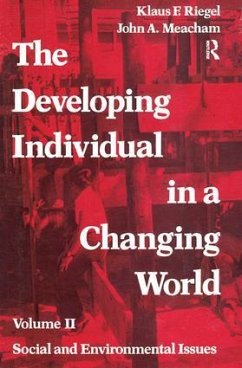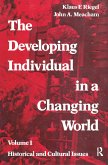Georgy Gounev
The Developing Individual in a Changing World
Volume 2, Social and Environmental Isssues
Georgy Gounev
The Developing Individual in a Changing World
Volume 2, Social and Environmental Isssues
- Gebundenes Buch
- Merkliste
- Auf die Merkliste
- Bewerten Bewerten
- Teilen
- Produkt teilen
- Produkterinnerung
- Produkterinnerung
This two-volume work levels both criticism and challenge to traditional developmental psychology
Andere Kunden interessierten sich auch für
![The Developing Individual in a Changing World The Developing Individual in a Changing World]() John A. MeachamThe Developing Individual in a Changing World112,99 €
John A. MeachamThe Developing Individual in a Changing World112,99 €![Changing Frontiers in the Science of Psychotherapy Changing Frontiers in the Science of Psychotherapy]() Allen BerginChanging Frontiers in the Science of Psychotherapy173,99 €
Allen BerginChanging Frontiers in the Science of Psychotherapy173,99 €![Psychology and the Developing World Psychology and the Developing World]() Stuart CarrPsychology and the Developing World91,99 €
Stuart CarrPsychology and the Developing World91,99 €![Analytical Psychology in a Changing World Analytical Psychology in a Changing World]() Analytical Psychology in a Changing World229,99 €
Analytical Psychology in a Changing World229,99 €![Changing the Self: Philosophies, Techniques, and Experiences Changing the Self: Philosophies, Techniques, and Experiences]() Changing the Self: Philosophies, Techniques, and Experiences91,99 €
Changing the Self: Philosophies, Techniques, and Experiences91,99 €![Changing Your Life for the Better Changing Your Life for the Better]() Jerrell A GoodenChanging Your Life for the Better21,99 €
Jerrell A GoodenChanging Your Life for the Better21,99 €![Mental Culture; Or The Means of Developing the Human Faculties: Or the Means of Developing the Human Mental Culture; Or The Means of Developing the Human Faculties: Or the Means of Developing the Human]() J. L. LevisonMental Culture; Or The Means of Developing the Human Faculties: Or the Means of Developing the Human33,99 €
J. L. LevisonMental Culture; Or The Means of Developing the Human Faculties: Or the Means of Developing the Human33,99 €-
-
-
This two-volume work levels both criticism and challenge to traditional developmental psychology
Produktdetails
- Produktdetails
- Verlag: Routledge
- Seitenzahl: 372
- Erscheinungstermin: 13. Juli 2017
- Englisch
- Abmessung: 235mm x 157mm x 25mm
- Gewicht: 689g
- ISBN-13: 9781138535107
- ISBN-10: 1138535109
- Artikelnr.: 49208738
- Herstellerkennzeichnung
- Libri GmbH
- Europaallee 1
- 36244 Bad Hersfeld
- gpsr@libri.de
- Verlag: Routledge
- Seitenzahl: 372
- Erscheinungstermin: 13. Juli 2017
- Englisch
- Abmessung: 235mm x 157mm x 25mm
- Gewicht: 689g
- ISBN-13: 9781138535107
- ISBN-10: 1138535109
- Artikelnr.: 49208738
- Herstellerkennzeichnung
- Libri GmbH
- Europaallee 1
- 36244 Bad Hersfeld
- gpsr@libri.de
Georgy Gounev
IV: Environmental conditions and the development of the individual
1: The responsive environment: Interdisciplinary developmental issues
A: Environmental Ontogeny: a Cognitive View
B: Environmental Reciprocity: a Socio-Emotional View
C: Histories and Futures: Aspects of a Study of The Child's Relation to the Land and the City
2: Effects of nutrition on development
A: Role of Nutrition in Human Development
B: Malnutrition In Infancy And Intellectual Development
C: Protein Malnutrition in Monkeys
3: Effects of communication media on child development
A: The Means of Instruction in the Attainment of Educational Goals
B: Cognitive Effects of Visual Media
C: Television and the Development of Social Behavior
V: Social organizations and the development of the individual
1: Variations in home-based early education: Language, play, and social development
A: The Construction and Selection of Environments: Design of the Study
B: Play: The Elaboration of Possibilities
C: Language: The Formation of Discourse
D: Social Development: Enriching Connections
E: The Emperor's New Clothes
2: Comparison of model preschool programs
A: Remarks About Curriculum Implementation
B: Short-Term Cognitive Effects of Eleven Preschool Models
C: Dimensional Analysis of Preschool Programs
D: Comparing Model Preschool Programs
VI: Interaction in social groups and the development of the individual
1: Social interaction and personality development
A: Social Perspective-Taking Training
Empathy and Role-Taking Ability of Preschool Children
B: Levels and Patterns of Social Engagement and Disengagement from Adolescence to Middle Adulthood
A: Education as an aid to Adaptation in the Adult Years
D: Interaction of Personality, Ses, and Social Participation in Old Age
D: The Generation Gap: Imagination or Reality?
F: Affluence, Reciprocity, and Solidary Bonds
2: Variations in infant-caretaker interactions
A: Family Interaction in The Newborn Period: Some Findings, Some Observations, and Some Unresolved Issues
B: The Relation of Infant's Temperament and Mother's Psychopathology to Interactions in Early Infancy
C: Mother-Infant Interaction, Attachment, and Mother's Psychopathology
D: Cohort Effects and Apparent Secular Trends in Infant Research
3: Sibling influences on the development of the individual
A: Sibling Position, Sex of Child, and Maternal Involvement
B: On the Extent of Sibling Influence
C: Sibling Interaction and Cognitive Development
D: Social Class, Family Size, and Cognitive Performance
E: The Assessment Of Stability And Change In Peer Interaction Of Normal Hearing And Deaf Preschool Children
1: The responsive environment: Interdisciplinary developmental issues
A: Environmental Ontogeny: a Cognitive View
B: Environmental Reciprocity: a Socio-Emotional View
C: Histories and Futures: Aspects of a Study of The Child's Relation to the Land and the City
2: Effects of nutrition on development
A: Role of Nutrition in Human Development
B: Malnutrition In Infancy And Intellectual Development
C: Protein Malnutrition in Monkeys
3: Effects of communication media on child development
A: The Means of Instruction in the Attainment of Educational Goals
B: Cognitive Effects of Visual Media
C: Television and the Development of Social Behavior
V: Social organizations and the development of the individual
1: Variations in home-based early education: Language, play, and social development
A: The Construction and Selection of Environments: Design of the Study
B: Play: The Elaboration of Possibilities
C: Language: The Formation of Discourse
D: Social Development: Enriching Connections
E: The Emperor's New Clothes
2: Comparison of model preschool programs
A: Remarks About Curriculum Implementation
B: Short-Term Cognitive Effects of Eleven Preschool Models
C: Dimensional Analysis of Preschool Programs
D: Comparing Model Preschool Programs
VI: Interaction in social groups and the development of the individual
1: Social interaction and personality development
A: Social Perspective-Taking Training
Empathy and Role-Taking Ability of Preschool Children
B: Levels and Patterns of Social Engagement and Disengagement from Adolescence to Middle Adulthood
A: Education as an aid to Adaptation in the Adult Years
D: Interaction of Personality, Ses, and Social Participation in Old Age
D: The Generation Gap: Imagination or Reality?
F: Affluence, Reciprocity, and Solidary Bonds
2: Variations in infant-caretaker interactions
A: Family Interaction in The Newborn Period: Some Findings, Some Observations, and Some Unresolved Issues
B: The Relation of Infant's Temperament and Mother's Psychopathology to Interactions in Early Infancy
C: Mother-Infant Interaction, Attachment, and Mother's Psychopathology
D: Cohort Effects and Apparent Secular Trends in Infant Research
3: Sibling influences on the development of the individual
A: Sibling Position, Sex of Child, and Maternal Involvement
B: On the Extent of Sibling Influence
C: Sibling Interaction and Cognitive Development
D: Social Class, Family Size, and Cognitive Performance
E: The Assessment Of Stability And Change In Peer Interaction Of Normal Hearing And Deaf Preschool Children
IV: Environmental conditions and the development of the individual
1: The responsive environment: Interdisciplinary developmental issues
A: Environmental Ontogeny: a Cognitive View
B: Environmental Reciprocity: a Socio-Emotional View
C: Histories and Futures: Aspects of a Study of The Child's Relation to the Land and the City
2: Effects of nutrition on development
A: Role of Nutrition in Human Development
B: Malnutrition In Infancy And Intellectual Development
C: Protein Malnutrition in Monkeys
3: Effects of communication media on child development
A: The Means of Instruction in the Attainment of Educational Goals
B: Cognitive Effects of Visual Media
C: Television and the Development of Social Behavior
V: Social organizations and the development of the individual
1: Variations in home-based early education: Language, play, and social development
A: The Construction and Selection of Environments: Design of the Study
B: Play: The Elaboration of Possibilities
C: Language: The Formation of Discourse
D: Social Development: Enriching Connections
E: The Emperor's New Clothes
2: Comparison of model preschool programs
A: Remarks About Curriculum Implementation
B: Short-Term Cognitive Effects of Eleven Preschool Models
C: Dimensional Analysis of Preschool Programs
D: Comparing Model Preschool Programs
VI: Interaction in social groups and the development of the individual
1: Social interaction and personality development
A: Social Perspective-Taking Training
Empathy and Role-Taking Ability of Preschool Children
B: Levels and Patterns of Social Engagement and Disengagement from Adolescence to Middle Adulthood
A: Education as an aid to Adaptation in the Adult Years
D: Interaction of Personality, Ses, and Social Participation in Old Age
D: The Generation Gap: Imagination or Reality?
F: Affluence, Reciprocity, and Solidary Bonds
2: Variations in infant-caretaker interactions
A: Family Interaction in The Newborn Period: Some Findings, Some Observations, and Some Unresolved Issues
B: The Relation of Infant's Temperament and Mother's Psychopathology to Interactions in Early Infancy
C: Mother-Infant Interaction, Attachment, and Mother's Psychopathology
D: Cohort Effects and Apparent Secular Trends in Infant Research
3: Sibling influences on the development of the individual
A: Sibling Position, Sex of Child, and Maternal Involvement
B: On the Extent of Sibling Influence
C: Sibling Interaction and Cognitive Development
D: Social Class, Family Size, and Cognitive Performance
E: The Assessment Of Stability And Change In Peer Interaction Of Normal Hearing And Deaf Preschool Children
1: The responsive environment: Interdisciplinary developmental issues
A: Environmental Ontogeny: a Cognitive View
B: Environmental Reciprocity: a Socio-Emotional View
C: Histories and Futures: Aspects of a Study of The Child's Relation to the Land and the City
2: Effects of nutrition on development
A: Role of Nutrition in Human Development
B: Malnutrition In Infancy And Intellectual Development
C: Protein Malnutrition in Monkeys
3: Effects of communication media on child development
A: The Means of Instruction in the Attainment of Educational Goals
B: Cognitive Effects of Visual Media
C: Television and the Development of Social Behavior
V: Social organizations and the development of the individual
1: Variations in home-based early education: Language, play, and social development
A: The Construction and Selection of Environments: Design of the Study
B: Play: The Elaboration of Possibilities
C: Language: The Formation of Discourse
D: Social Development: Enriching Connections
E: The Emperor's New Clothes
2: Comparison of model preschool programs
A: Remarks About Curriculum Implementation
B: Short-Term Cognitive Effects of Eleven Preschool Models
C: Dimensional Analysis of Preschool Programs
D: Comparing Model Preschool Programs
VI: Interaction in social groups and the development of the individual
1: Social interaction and personality development
A: Social Perspective-Taking Training
Empathy and Role-Taking Ability of Preschool Children
B: Levels and Patterns of Social Engagement and Disengagement from Adolescence to Middle Adulthood
A: Education as an aid to Adaptation in the Adult Years
D: Interaction of Personality, Ses, and Social Participation in Old Age
D: The Generation Gap: Imagination or Reality?
F: Affluence, Reciprocity, and Solidary Bonds
2: Variations in infant-caretaker interactions
A: Family Interaction in The Newborn Period: Some Findings, Some Observations, and Some Unresolved Issues
B: The Relation of Infant's Temperament and Mother's Psychopathology to Interactions in Early Infancy
C: Mother-Infant Interaction, Attachment, and Mother's Psychopathology
D: Cohort Effects and Apparent Secular Trends in Infant Research
3: Sibling influences on the development of the individual
A: Sibling Position, Sex of Child, and Maternal Involvement
B: On the Extent of Sibling Influence
C: Sibling Interaction and Cognitive Development
D: Social Class, Family Size, and Cognitive Performance
E: The Assessment Of Stability And Change In Peer Interaction Of Normal Hearing And Deaf Preschool Children









